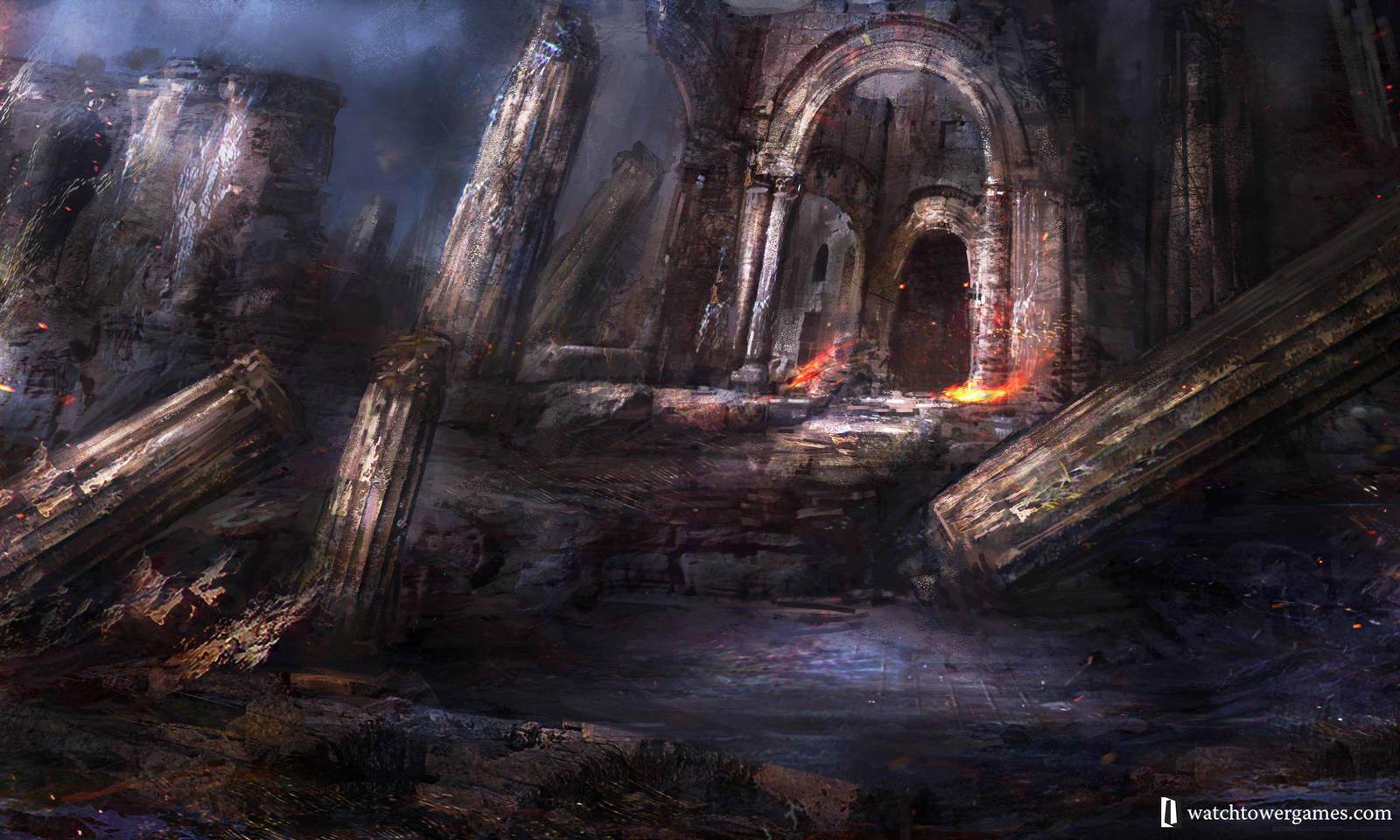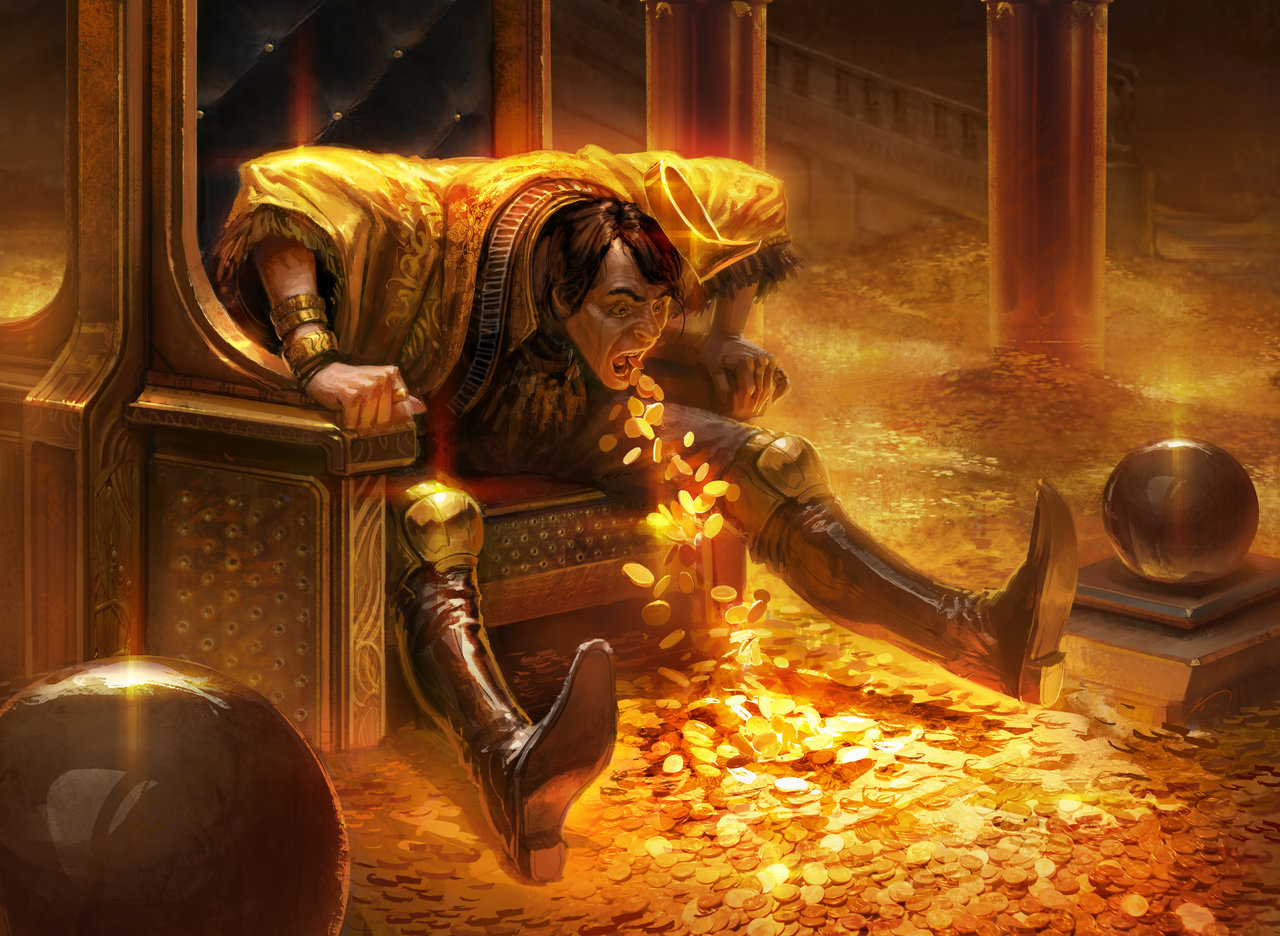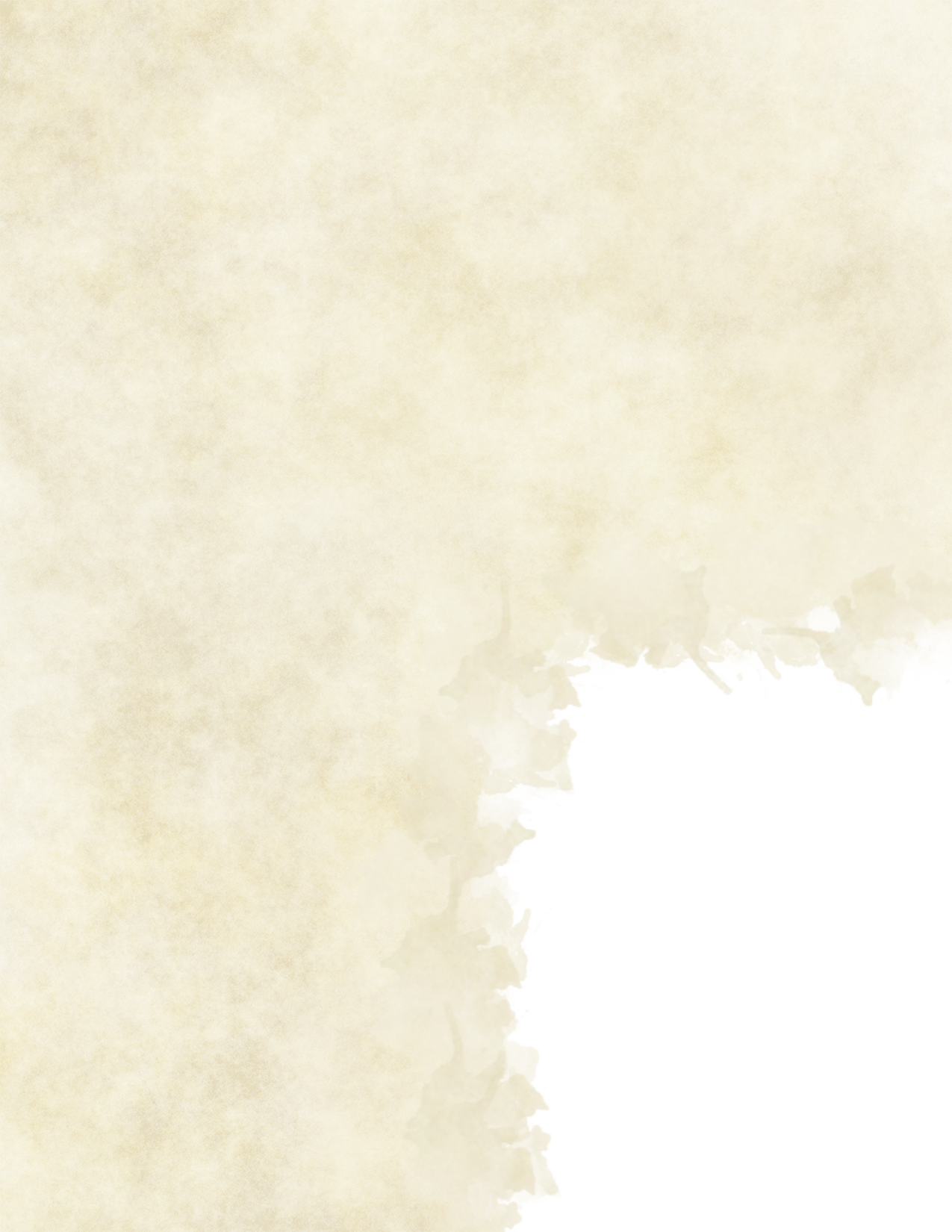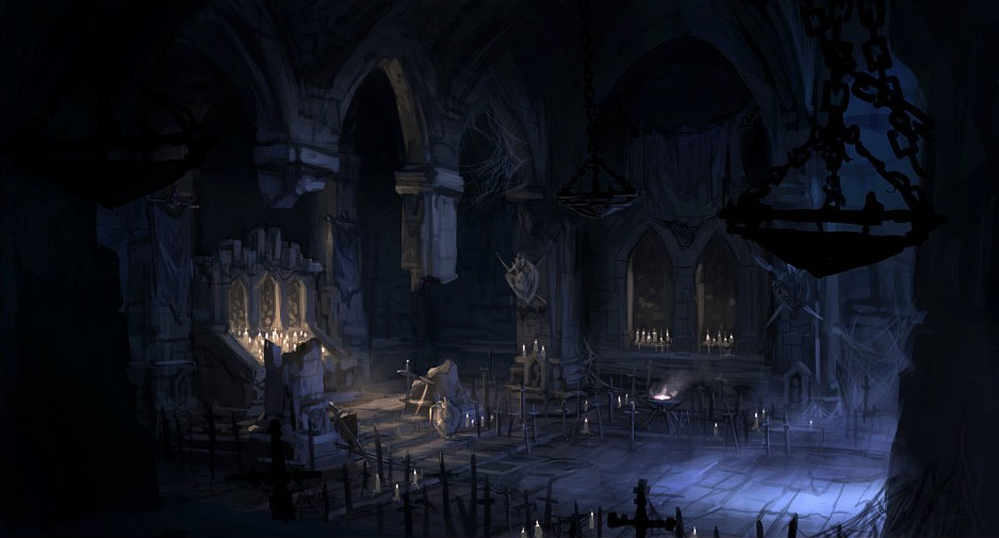Oath Breaker
By Halogen
A paladin is defined by one thing above all else: their committment to their oath. The oath is what binds a paladin to their holy cause granting them their righteous power and driving them towards their ultimate goal.
However, paladins are, among many other things, fallible. They are subject to the same avarice, trappings, and temptations as any other person. And that can mean that a paladin may be drawn off of the path of righteousness, straying towards the darkness. In the event that a paladin abandons their oath and chooses to violate its principles, a DM can decide that they must become an Oath Breaker, a corrupt perversion of their formal self.
There is an "Oathbreaker" option presented on page 97 in the Dungeon Master's Guide, from which several features presented herein are inspired. However, this particular oathbreaker falls short in conveying the complexity of a character's descent into darkness; its features assume that the oathbreaker PC is in league with undead and fiends, and has some degree of control over them, all while maintaining iconic paladin class features such as Aura of Protection, and Lay on Hands.
This set of new oath breaker options seeks to holistically adjust the paladin chassis to truly reflect their newfound iniquity. Each paladin class feature has been changed, and the DM, player, or both, can choose one of the five options presented depending on the paladin's most driving emotion in their fall; Apathy, Cruelty, Desire, Despair, or Pride.
Whichever of these are selected, replace the paladins Sacred Oath subclass features, and represent the oath breaker drawing upon a newfound dark power that fuels their growth in the oath breaker class.
Seeking Atonement
While the fantasy cosmology of Dungeons & Dragons prescribes an innate sense of good and evil, redemption is still something that is possible for an oath breaker to seek. It is the purview of the DM to determine how an oath breaker might go about atoning for their transgression, and what consequences may lie in store for a given player character. This should depend on the disposition of the character, the society in which they live, and the circumstances under which they broke their oath, as well as what crimes they may have committed since then.
An oath breaker who wishes to atone for their sins and abandon the path they've taken will not have an easy time of it, and it will grow more difficult the more levels of this class that they have. However, should they prove that they have truly earned back the trust that they had lost, then a DM could decide that they may become a paladin once more, or if not a paladin, a fighter of equivalent level.


Oath Breaker
| Level | Proficiency Bonus | Features | Spells Known | 1st | 2nd | 3rd | 4th | 5th |
|---|---|---|---|---|---|---|---|---|
| 1st | +2 | Unholy Calling | — | — | — | — | — | — |
| 2nd | +2 | Faithless Smite, Spellcasting | 2 | 2 | — | — | — | — |
| 3rd | +2 | Downfall | 3 | 3 | ─ | ─ | — | — |
| 4th | +2 | Ability Score Improvement | 3 | 3 | ─ | ─ | — | — |
| 5th | +3 | Extra Attack | 4 | 4 | 2 | ─ | — | — |
| 6th | +3 | Betrayer's Conviction | 4 | 4 | 2 | ─ | — | — |
| 7th | +3 | Downfall feature | 5 | 4 | 3 | ─ | — | — |
| 8th | +3 | Ability Score Improvement | 5 | 4 | 3 | ─ | — | — |
| 9th | +4 | —— | 6 | 4 | 3 | 2 | — | — |
| 10th | +4 | Downfall feature | 6 | 4 | 3 | 2 | — | — |
| 11th | +4 | Improved Faithless Smite | 7 | 4 | 3 | 3 | — | — |
| 12th | +4 | Ability Score Improvement | 7 | 4 | 3 | 3 | — | — |
| 13th | +5 | —— | 8 | 4 | 3 | 3 | 1 | — |
| 14th | +5 | Wretched Words | 8 | 4 | 3 | 3 | 1 | — |
| 15th | +5 | Downfall feature | 9 | 4 | 3 | 3 | 2 | — |
| 16th | +5 | Ability Score Improvement | 9 | 4 | 3 | 3 | 2 | — |
| 17th | +6 | —— | 10 | 4 | 3 | 3 | 3 | 1 |
| 18th | +6 | Betrayer's Due | 10 | 4 | 3 | 3 | 3 | 1 |
| 19th | +6 | Ability Score Improvement | 11 | 4 | 3 | 3 | 3 | 2 |
| 20th | +6 | Downfall feature | 11 | 4 | 3 | 3 | 3 | 2 |
——Spell Slots by Spell Level——





Class Features
As an oath breaker, you retain the health, hit dice, skills, and saving throw proficiencies that you had as a paladin.
Unholy Calling
Your "Divine Sense" and "Lay on Hands" features from 1st level are replaced with this feature.
You can use an action you can channel one of the remaining vestiges of your divinity to gain a number of temporary hit points equal to twice your oath breaker level. You can use this feature a number of times equal to your Charisma modifier, and you regain all expended uses when you complete a short rest.
If you take radiant damage while you have these temporary hit points, you must make a Constitution saving throw, the DC for which is equal to 5 + the amount of radiant damage taken. On a failure, you lose all temporary hit points, and are stunned until the end of your next turn.
Additionally, you radiate a foul energy and your being is threaded with traces of your sin. You register as having been desecrated by effects that can sense alignment or creature type, such as by a paladin's Divine Sense or by the detect evil and good spell.
Faithless Smite
Your "Divine Smite" feature from 2nd level is replaced with this feature.
When you hit a creature with a melee weapon attack, you can expend one spell slot to deal necrotic damage to the target, in addition to the weapon's damage. The extra damage is 2d8 for a 1st-level spell slot, plus 1d8 for each spell level higher than 1st, to a maximum of 5d8.
Fighting Style
You can retain the same fighting style you had as a paladin after you become an oath breaker, with the exception of the Protection fighting style.
If you had the Protection fighting style as a paladin, you may choose a new fighting style from the options presented below.
Defense
While you are wearing armor, you gain a +1 bonus to AC.
Dueling
When you are wielding a melee weapon in one hand and no other weapons, you gain a +2 bonus to damage rolls with that weapon.
Great Weapon Fighting
When you roll a 1 or 2 on a damage die for an attack you make with a melee weapon that you are wielding with two hands, you can reroll the die and must use the new roll. The weapon must have the two-handed or versatile property for you to gain this benefit.
Two-Weapon Fighting
When you engage in two-weapon fighting, you can add your ability modifier to the damage of the second attack.
Spellcasting
When you become an oath breaker, you maintain your spellcasting through a dark contrivance; rather than drawing upon your conviction and faith through prayer, your magical power is now derived from your conviction in your own path.
Your spell list changes when you become an oath breaker, which is detailed in the table at the end of this document.
Spell Slots
The Oath breaker table shows how many spell slots you have to cast your oath breaker spells of 1st level and higher. To cast one of these spells, you must expend a slot of the spell's level or higher. You regain all expended spell slots when you finish a long rest.
For example, if you know the 1st-level spell bane and have a 1st-level and a 2nd-level spell slot available, you can cast bane using either slot.
Spells Known of 1st Level and Higher
When you break your Sacred Oath and begin your downfall, you must select a number of spells depending on the Spells Known column of the Oath Breaker table that you have prepared to become the spells you know.
You must select spells that are on the oath breaker spell list. If necessary, you may select additional spells that you did not have prepared in order to make up your Spells Known.
The Spells Known column of the Oath Breaker table shows when you learn more oath breaker spells of your choice. Each of these spells must be of a level for which you have spell slots. For instance, when you reach 5th level in this class, you can learn one new spell of 1st or 2nd level.
Additionally, when you gain a level in this class, you can choose one of the oath breaker spells you know and replace it with another spell from the oath breaker spell list, which also must be of a level for which you have spell slots.
Spellcasting Ability
Charisma is your spellcasting ability for your oath breaker spells, since your magical ability is derived from the the magnitude of your avarice. You use your Charisma whenever a spell refers to your spellcasting ability.
In addition, any time one of your Oath Breaker or Downfall features calls for a saving throw, when you cast an oath breaker spell, or you make a spell attack roll, you use your Charisma modifier when setting the saving throw DC.
Spell Save DC
Spell attack modifier
Spellcasting Focus
When you become an oath breaker, you can perform a foul ritual in order to desecrate your holy symbol and use it as a spellcasting focus for your oath breaker spells. Such a ritual may constitute dedicating it to a dark idol, or soaking it in the blood of a former ally.
Downfall
3rd level is the first point where it is actually possible to become an oath breaker - this is where you have definitively violated your sacred oath, and some cardinal sin has become your downfall. When you begin this journey, all of your paladin features are replaced with oath breaker features, and moving forward you can gain levels in the oath breaker class.
Your downfall is determined by the nature of your violation of your oath, and the driving emotion that caused you to make that choice. You and your DM choose between one of 5 options: Apathy, Cruelty, Desire, Despair, or Pride.
Your downfall grants you features at 3rd level and again at 7th, 10th, 15th, and 20th level.
Downfall Spells
You learn an additional spell when you reach certain levels in this class, as shown in the Downfall Spells table. The spell counts as a oath breaker spell for you, but it doesn't count against the number of oath breaker spells you know.
Ability Score Improvement
When you reach 4th level, and again at 8th, 12th, 16th, and 19th level, you can increase one ability score of your choice by 2, or you can increase two ability scores of your choice by 1. As normal, you can't increase an ability score above 20 using this feature.
Extra Attack
Beginning at 5th level, you can attack twice, instead of once, whenever you take the Attack action on your turn.
Betrayer's Conviction
Starting at 6th level, you must hold fast to your choices, and let them grant you strength, lest you even further lose your way. You gain a bonus to weapon damage rolls equal to your Charisma modifier (a minimum bonus of +1).



Improved Faithless Smite
By 11th level, you are so steeped in vice that all of your melee weapon strikes carry a wicked energy with them. Whenever you hit a creature with a melee weapon, the creature takes an extra 1d8 necrotic damage. When you deal this necrotic damage, that creature can not regain hit points until the end of their next turn.
Wretched Words
Starting at 14th level, you gain the ability to issue wretched curses on your foes. When a creature with 30 feet of you that you can see makes a saving throw against one of your oath breaker spells, you can use your reaction to expend one use of your Unholy Calling feature to impose disadvantage on their saving throw.
Betrayer's Due
Starting at 18th level, you have walked a road of dark conviction for long enough that you have irrevocably lost your connection to the light.
Your alignment is unable to be changed by any means short of a cleric's Divine Intervention, and your creature type changes from humanoid to fiend.
Oath Breaker Downfalls
Downfall by Apathy
When a paladin loses faith in their holy cause, they can also lose the motivation entirely to continue on in their adventure. The stress of travel, living in squalor, and being forced to rely on other adventurers for support can all contribute to this tedium. When a paladin no longer has the will to persist in their sacred oath, they atrophy into Apathy.
These oath breakers seek to avoid having to expend too much energy to overcome problems, and would rather everyone use as little effort as they do. Such an oath breaker might also prefer to avoid encounters with stronger opponents, if they believe that a more direct encounter would require too much investment on their part.
Fatal Flaw
Upon falling to apathy, you gain the following flaw:
Lazy. There is no point in trying to affect change in the world. I allow others to do whatever I don't want to.
Downfall Spells
You gain a downfall spell at the oath breaker levels listed.
Downfall by Apathy Spells
| Oath Breaker Level | Spell |
|---|---|
| 3rd | sanctuary |
| 5th | suggestion |
| 9th | slow |
| 13th | Otiluke's resilient sphere |
| 17th | mislead |
Hide Out
Starting at 3rd level, you become able to harness your apathy to escape detection and responsibility. As an action, you can become invisible for 1 minute, or until you make an attack or cast a spell.
While invisible, you can use a bonus action on your turn to teleport to an unoccupied space that you can see within 30 feet of you. When you teleport in this way, you gain the following benefits and detriments until you become visible again:
- You have advantage on all Dexterity (Stealth) checks.
- Your location can't be determined or revealed by divination magic.
- Your movement speed is halved
Once you use this feature, you can not do so again until you complete a short or long rest.
Sedation
Starting at 7th level, you can choose to exude an aura of passive indifference as a bonus action on your turn causing the space within 10 feet of you to be considered magical difficult terrain.
This aura lasts as long as your conscious, or until you quell the aura as a bonus action.
Pause
Starting at 10th level, you are able to inflict a sinful curse on those you wish to corrupt. You may direct your ire at a creature that you can see within 30 feet of you, and utter a baleful word in order to curse them. The target must succeed on a Wisdom saving throw, or be cursed for 1 minute.
At the beginning of each of a cursed target's turns, it must make a Wisdom saving throw. On a failed save, the target's movement speed is reduced to 0 and it can not benefit from any increase to its speed until the beginning of its next turn.
Once you use this feature, you can not do so again until you complete a long rest.
Weary Defense
Starting at 15th level, your unwillingness to commit to action can thwart even the most persistent foes.
When you use your action to Dodge, and a creature that you can see misses you with an attack, you can use your reaction to sap it of its strength and will. That creature must succeed on a Constitution saving throw, or gain 1 level of exhaustion.
If a creature succeeds on a saving throw against this effect, it loses any levels of exhaustion previously inflicted by this feature, and is subsequently immune to this effect for 24 hours.
Eternal Respite
At 20th level, your commitment to non-interaction lets you separate yourself from the world entirely.
You can cast the sequester spell on yourself at will, without expending a spell slot or providing material components.
Downfall by Cruelty
Rare is the paladin who leaves a dungeon with an unsoiled blade. A sacred oath of protection typically entails the slaying of any number of monsters, tyrants, and those who oppose you in your divine righteousness.
However, not all paladins fight for such altruistic and noble causes, and it is possible for them to be caught up in the thrill of committing atrocities. Such a person begins to walk the dark descent into Cruelty.
Falling to cruelty means relentlessly pursuing targets of your boundless wrath. You may no longer discriminate between innocent and guilty targets, caring instead only about drawing blood. Death even isn't enough for this oath breaker to inflict, and they may be prone to seek the suffering of their victims before ultimately eliminating them.
Fatal Flaw
Upon falling to cruelty, you gain the following flaw:
Vindictive. I never look past any slight passed against me. Anyone in my way, ought to be crushed, and made to suffer.
Downfall Spells
You gain a downfall spell at the oath breaker levels listed.
Downfall by Cruelty Spells
| Oath Breaker Level | Spell |
|---|---|
| 3rd | witch bolt |
| 5th | heat metal |
| 9th | vampiric touch |
| 13th | phantasmal killer |
| 17th | cloudkill |
Bloodlust
Starting at 3rd level, when you score a critical hit or reduce a creature to 0 hit points, each creature within 30 feet of it that can see you must succeed on a Wisdom saving throw or be frightened of you until the end of your next turn.
As a bonus action on your turn, you can move up to your speed towards a creature that is frightened of you and make a single weapon attack against it.
Brutality
Starting at 7th level, you constantly exude a bloodcurdling presence in battle. While you are conscious, a creature within 10 feet of you has disadvantage on saving throws made to avoid being frightened by you.
Additionally, when a creature in this aura targets you with an attack of opportunity against you, it must first succeed on a Wisdom saving throw, or lose the attack.


Prey
Starting at 10th level, you are able to inflict a sinful curse on those you wish to corrupt. You may direct your ire at a creature that you can see within 30 feet of you, and utter a baleful word in order to curse it. The target must succeed on a Wisdom saving throw, or be cursed for 1 minute.
While cursed, the target is marked for suffering and death. You have advantage on attack rolls against the cursed target, and it has disadvantage on any Dexterity (Stealth) checks made to avoid your sight. Additionally, whenever you score a critical hit against a cursed target, you roll the attack's damage dice three times, rather than twice.
Once you use this feature, you can not do so again until you complete a long rest.
Savage Grip
Starting at 15th level, weak creatures pose no threat to you. When you deal damage to a creature that reduces it to a number of hit points less than your oath breaker level, you can use your bonus action to perform one of the following:
Torment's Shackles. The creature must succeed on a Wisdom saving throw or become paralyzed for 1 hour.
Vicious Execution. The creature is instantly reduced to 0 hit points and killed. A creature killed in this way can not benefit from the revivify or raise dead spells, due to the toll of the execution on its body.
Sepulcher
At 20th level, you can use an action to surround yourself with an aura of gloom that lasts for 1 minute.
The aura reduces any bright light in a 30-foot radius around you to dim light. Whenever a creature that is frightened you starts its turn in the aura, it takes 4d10 psychic damage. Additionally, your aura surrounds you in a wicked shadow, causing creatures that rely on sight to have disadvantage on attack rolls against you.
Once you use this feature, you can not do so again until you complete a long rest.
Downfall by Desire
An inevitable part of adventuring, is the accumulation of wealth (typically in the form of belongings pilfered from fallen opponents). Many paladins use such wealth for philanthropic purposes, to heal the sick, to clothe the poor, or to fund the operation of a temple.
However, not everyone can resist the allure of gold, and the immense power that magical items and treasure can promise. Such a temptation leads one to fall to Desire, an irrevocable passage that warps the will of greedy paladins to become relentless seekers of wealth.
These oath breakers will stop at nothing to amass a hoard that rivals even dragons, or might seek the power of magical artifacts long deemed too evil for mortal hearts to withstand. Their selfishness knows no bounds, and ensures that any person who aids them is inevitably doomed to be betrayed.
Fatal Flaw
Upon falling to this desire, you gain the following flaw:
Greed. Any time I do something for someone, I expect payment in return. I will do anything in order to accumulate greater power and treasure.
Downfall Spells
You gain a downfall spell at the oath breaker levels listed.
Downfall by Desire Spells
| Oath Breaker Level | Spell |
|---|---|
| 3rd | charm person |
| 5th | knock |
| 9th | glyph of warding |
| 13th | Leomund's secret chest |
| 17th | modify memory |
Clutch of Graz'zt
Starting at 3rd level, whenever a creature you can see within 10 feet of you casts, or is targeted with, a spell or magical effect that would benefit it, you can use your reaction to snatch that effect for yourself. The target must succeed on a Charisma saving throw, or have the spell or effect be cast on you instead. When you snatch a spell or effect in this way that requires concentration, you must yourself concentrate on it in order to maintain the effect for its full duration.
Once you use this feature, you can't use it again until you finish a short or long rest.
Envy
Starting at 7th level, whenever a humanoid within 30 feet of you is charmed by you, you can use a bonus action to drain it of some of its life force. The target must succeed on a Constitution saving throw, or suffer an amount of psychic damage equal to your oath breaker level, causing you to regain that same number of hit points.
Craving
Starting at 10th level, you are able to inflict a sinful curse on those you wish to corrupt. You may direct your ire at a creature that you can see within 30 feet of you, and utter a baleful word in order to curse it. The target must succeed on a Wisdom saving throw, or be cursed for 1 minute.
While cursed, the target believes that every creature it can see is intent on stealing all of its belongings, and has disadvantage on any Wisdom (Insight) checks it makes for the duration.
Additionally, if the cursed creature can see any valuable objects that are not being carried or worn at the beginning of its turn, such as loose gold, magic tomes, or gem-encrusted blades, it must make a Wisdom saving throw. On a failure, it must spend all of its movement on that turn to take the safest path to the nearest such object.
Once you use this feature, you can not do so again until you complete a long rest.
Miser
Starting at 15th level, you have an innate magical ability and calling to acquire treasure and grow your wealth. When you cast a spell that requires a material component with a cost, you can reduce the cost required by an amount of gp equal to half the total + 250.
Additionally, you have advantage on Charisma checks when attempting to convince someone of an object’s value, as well as on Wisdom (Insight) checks when discerning the value of objects presented by others.


Object of Desire
At 20th level, you can use an action to assume an appearance of lurid beauty and wealth, gaining the following benefits for 1 minute, or until you become incapacitated:
If a creature starts its turn within 30 feet of you and can see you, it must succeed on a Wisdom saving throw or be charmed by you until the start of its next turn. A creature who succeeds on this saving throw is immune to the effect for 24 hours.
Unless surprised, a creature can avert its eyes to avoid the saving throw at the start of its turn. If the creature does so, it can't see you until the start of its next turn, when it can avert its eyes again. If the creature looks at the you at all in the meantime, it must immediately make the save. A creature that is charmed by you with this feature has a movement speed of 0.
Once you use this feature, you can not do so again until you complete a long rest.
Downfall by Despair
Tragedy can be a motivating incident for a paladin to swear their sacred oath, but it can also be a horrible burden to bear. A paladin who encounters crushing overwhelming odds can have their light extinguished, and replaced with naught but terminal dread, setting them on a descent into Despair.
These oath breakers no longer has any hope of their own, and can't help but seek others to whom to spread their misery. Their complete lack of goodness means they perhaps commit more heinous atrocities than any other creature alive or dead.
Fatal Flaw
Upon falling to this despair, you gain the following flaw:
Gloom. There is little left in this world for me, or for anyone. Life is ultimately pointless, and I can not stop thinking of the doom that awaits us all.
Downfall Spells
You gain a downfall spell at the oath breaker levels listed.
Downfall by Despair Spells
| Oath Breaker Level | Spell |
|---|---|
| 3rd | dissonant whispers |
| 5th | ray of enfeeblement |
| 9th | hunger of Hadar |
| 13th | confusion |
| 17th | synaptic static |
Wither
Starting at 3rd level, your burdening presence withers away at the health of your enemies.
When a creature you can see is under the effect of a spell you are concentrating on, you can use a bonus action on your turn to inflict a number of necrotic damage to it equal to your Charisma modifier. That creature's hit point maximum decreases by the same amount.
This reduction lasts until the target completes a long rest.
Anguish
Starting at 7th level, you can choose to exude an aura of profound melancholy as a bonus action on your turn, causing the space within 10 feet of you becomes laden with negative emotion. This aura lasts as long as your conscious, or until you quell the aura as a bonus action.
A creature within this aura can not make more than one attack on its turn, and can not benefit from advantage on any attack rolls, ability checks, or saving throws.
Isolation
Starting at 10th level, you are able to inflict a sinful curse on those you wish to corrupt. You may direct your ire at a creature that you can see within 30 feet of you, and utter a baleful word in order to curse it. The target must succeed on a Wisdom saving throw, or be cursed for 1 minute.
At the beginning of each of a cursed target's turns, it must make a Charisma saving throw. On a failed save, the target can not regain hit points, nor can it benefit from any spells that target it or include it in their area of effect until the beginning of its next turn.
Once you use this feature, you can not do so again until you complete a long rest.
Dour Instruction
Starting at 15th level, you gain the ability to douse the hope of anyone you see.
While your Anguish feature is active, you can cast the command spell without knowing it, having it prepared, and without the need to expend a spell slot. When you cast command in this way, the command word is "grovel".
Lay to Rest
At 20th level, you can extinguish light and hope in the surrounding area, plunging your soul and others into darkness.
As an action, you can cast a shadow that fills a 120 foot sphere centered on yourself into dim light. This shadow lasts for 1 minute, and extinguishes all light sources in the space, except for one conjured by a wish spell. A creature who starts or ends its turn in this dim light, must succeed on a Constitution saving throw or fall unconscious for the duration.
Once you use this feature, you can not do so again until you complete a long rest.
Downfall by Pride
Whether tending the wounded, smiting hordes of creatures, paladins wield massive power. With such power and glory, some paladins grow addicted to the sensation of praise and gratitude that can come from doing good. Descending into Pride, an oath breaker eschews their noble cause in pursuit of vanity and followers, believing that they are too grand to waste their time with charity.
Fatal Flaw
Upon falling to pride, you gain the following flaw:
Hubris. I am the greatest there ever was, or ever will be. I am above trifling tasks, and others ought to beg to serve me.



Downfall Spells
You gain a downfall spell at the oath breaker levels listed.
Downfall by Pride Spells
| Oath Breaker Level | Spell |
|---|---|
| 3rd | Tasha's hideous laughter |
| 5th | enhance ability |
| 9th | thunder step |
| 13th | freedom of movement |
| 17th | planar binding |
Perfect Likeness
Starting at 3rd level, your perfection is such that only one of you just isn't enough.
As an action, you can conjure a perfect duplicate of yourself that appears in an unoccupied space within 10 feet of you. The duplicate lasts for 1 minute, or until you lose concentration (as if you were concentrating on a spell). Your duplicate is considered a creature, with an AC of 10, and a number of hit points equal to half of your hit point maximum. The duplicate is illusory and resembles you in appearance, the sounds that it makes, and how it smells.
As a bonus action on your turn, you can command your duplicate to move to an unoccupied within 30 feet, or to take the Dodge action. Additionally, when both you and your illusion are within 5 feet of a creature that can see the illusion, you have advantage on attack rolls against that creature, given how uncanny the illusion is.
Once you use this feature, you can not do so again until you complete a short or long rest.
Grandeur
Starting at 7th level, your grand sense of self grants you advantage on saving throws to resist being charmed while you are conscious.
Additionally, when a creature within 5 feet of you misses you with a melee attack, you can use your reaction to force it to reroll the attack against a different creature of your choice that you can see within 5 feet of you.
Arrogance
Starting at 10th level, you are able to inflict a sinful curse on those you wish to corrupt. You may direct your ire at a creature that you can see within 30 feet of you, and utter a baleful word in order to curse it. The target must succeed on a Wisdom saving throw, or be cursed for 1 minute.
While cursed, the target has absolute, and misplaced, faith in its ability, such that it can not see its failures. Any time the creature misses with an attack, or fails an ability check or saving throw, it fully believes instead that it succeeded, rationalizing any illogical outcomes that result from this.
When the curse ends, the target suffers 1d10 psychic damage for each such misconstrued success, to a maximum of 10d10 damage.
Once you use this feature, you can not do so again until you complete a long rest.
Flawless Façade
Starting at 15th level, you are so assured in the veracity of your beliefs, that neither you nor anyone else can decipher your true intention.
Whenever you make a Charisma ability check you can treat a d20 roll of 9 or lower as a 10. Additionally, no matter what you say, magic that would determine if you are telling the truth indicates that you are being truthful.
Supreme Ego
At 20th level, you can use an action to become a figure that is almost as amazing as you think you are. For 1 minute, you gain the following benefits:
- You gain a number of temporary hit points equal to your hit point maximum.
- You are considered under the effect of the enlarge spell.
- Once on each of your turns, you can turn a missed weapon attack into a hit.
Once you use this feature, you can not do so again until you complete a long rest.


Spell List
The oath breaker spell list has been adjusted as a result of a paladins descent into darkness.
1st level
- Bane
- Cause Fear
- Command
- Compelled Duel
- Detect Evil and Good
- Detect Magic
- Detect Poison and Disease
- Hellish Rebuke
- Hex
- Inflict Wounds
- Protection from Evil and Good
- Searing Smite
- Thunderous Smite
- Wrathful Smite
2nd level
- Blindness/Deafness
- Branding Smite
- Crown of Madness
- Darkness
- Find Steed
- Locate Object
- Magic Weapon
- Phantasmal Force
- Protection from Poison
- Zone of Truth
3rd level
- Animate Dead
- Bestow Curse
- Blinding Smite
- Dispel Magic
- Elemental Weapon
- Enemies Abound
- Fear
- Magic Circle
- Nondetection
- Remove Curse
- Summon Lesser Demons
4th level
- Banishment
- Blight
- Death Ward
- Find Greater Steed
- Locate Creature
- Phantasmal Killer
- Shadow of Moil
- Sickening Radiance
- Staggering Smite
- Summon Greater Demon
5th level
- Banishing Smite
- Circle of Power
- Contagion
- Danse Macabre
- Destructive Wave
- Dispel Evil and Good
- Dominate Person
- Geas
- Immolation
- Insect Plague
- Infernal Calling
- Raise Dead
Removed Spells
1st level
- Bless
- Ceremony
- Cure Wounds
- Divine Favor
- Heroism
- Purify Food and Drink
- Shield of Faith
2nd level
- Aid
- Lesser Restoration
3rd level
- Aura of Vitality
- Create Food and Water
- Crusader's Mantle
- Daylight
- Remove Curse
- Revivify
4th level
- Aura of Life
- Aura of Purity
5th level
- Holy Weapon
Added Spells
1st level
- Cause Fear
- Hellish Rebuke
- Hex
- Inflict Wounds
2nd level
- Blindness/Deafness
- Crown of Madness
- Darkness
- Phantasmal Force
3rd level
- Animate Dead
- Bestow Curse
- Enemies Abound
- Fear
- Summon Lesser Demons
4th level
- Blight
- Phantasmal Killer
- Shadow of Moil
- Sickening Radiance
- Summon Greater Demon
5th level
- Contagion
- Danse Macabre
- Dominate Person
- Immolation
- Insect Plague
- Infernal Calling
Closing
This Oath Breaker concept is by Halogen
Or Halogen#9841 on Discord.
It is also a product of much conversation and revision in the Haven Discord server, a great home for games and homebrew.
This concept began initially as a conversation about the 7 Deadly Sins and their potential as a set of joke subclasses for paladin. From there it became clear to me that each of the sins could succinctly represent a reason why a paladin may have broken their sacred oath.
This in conjunction with my general dissatisfaction with the Oathbreaker presented in the DMG as a "mostly paladin but with some undead and fiend features and an edgy aura", led to my desire to overhaul an entirely new "oath breaker" chassis for which to make specific subclasses that could be more personalized to a given paladin. This offered quite a bit of freedom, not being constrained to the restrictive subclass template that often plagues paladin subclasses.
In general, the goal was to eliminate features like Divine Sense and Aura of Protection that reference the paladin's inherent divinity and goodness. Thusly, the oath breaker's class features reflect their decidedly evil shift.
The change from preparing spells to spells known reflects this as well, in addition to the changes reflected in the spell list on page 10. This was because I couldn't find a way to justify why a paladin would keep their ability to change their spells without having something to pray to, but I still wanted them to maintain the general feeling To compensate for the more limited amount of flexibility in preparing spells, the spell list was expanded a bit just to add some spice.
Perhaps most finicky of all, the Aura of Courage is the only base class feature that did not receive a single direct analogue. Instead, I decided to make 10th level an additional subclass break (which I believe should be the same for paladin, but they didn't ask me to write the Player's Handbook). Each downfall receives at 10th level, a personal "curse" that allows them to inflict some measure of their vice onto others.
All in all, this project was a large exercise in class design, and I am proud of the final product. It is my earnest hope that DMs see this and think to themselves, "this looks much more interesting should a paladin descend into darkness!". The paladin class is ripe with opportunity for difficult choices, and breaking your oath ought to be a dramatic event in a game!
That said, falling to the dark side should also come with certain perks. What you lose in protection and healing, you gain in raw power and ability to manipulate darkness. And I think it isn't at all wrong for a player to want to have more options for an evil paladin. I hope that my oath breakers can provide these for your table, and that you use them well.
Alternate Rules
The following can serve as alternate or additional rules for using this oath breaker class.
Dark Instrument
In order to progress in this class, you must commit ever increasingly evil acts that reflect the darkness in your soul. To gain an oath breaker level, you must tempt a cleric or paladin from their holy path to your dark design. You must also seek out other paladins and good-aligned creatures to kill if they do not serve your new aims.
Evil Steeds
At 6th level, when you cast the find steed spell, you conjure either a giant lizard or warhorse skeleton.
At 14th level, when you cast the find greater steed spell, you conjure a nightmare.
Malignant Servant
When you break your oath, you become a servant of a new master, such as an archfiend or a cabal of cultists. You are promised great power or an enduring legacy upon your death.
Spells Prepared
Rather than having Spells Known, you can prepare a number of spells from the oath breaker spell list each day equal to half your oath breaker level + your Charisma modifier.
This rule could be justified in conjunction with the "Malignant Servant" rule as well.
Art Credits
Page 1: Rain - Eugene Lizin
Page 2: Ruined Stronghold - Christian Quinot
Page 3: Solemn Visitor - Cynthia Sheppard
Page 4: Sword in the Ground - Taaks
Page 6: Fantasia Fallen Kings
Page 7: Greed - Izzy
Page 9: Echo & Narcissus - JW Waterhouse
Page 10: Altar - Darksiders II